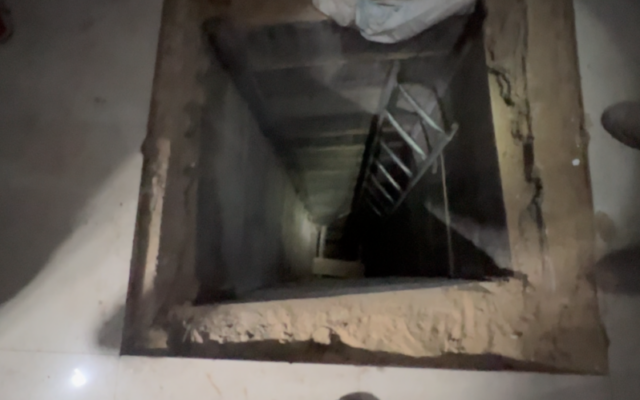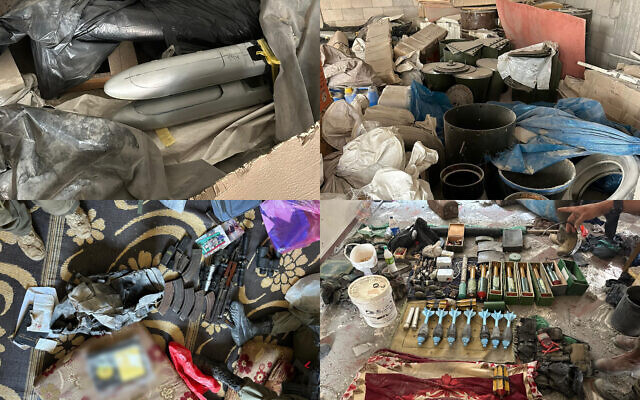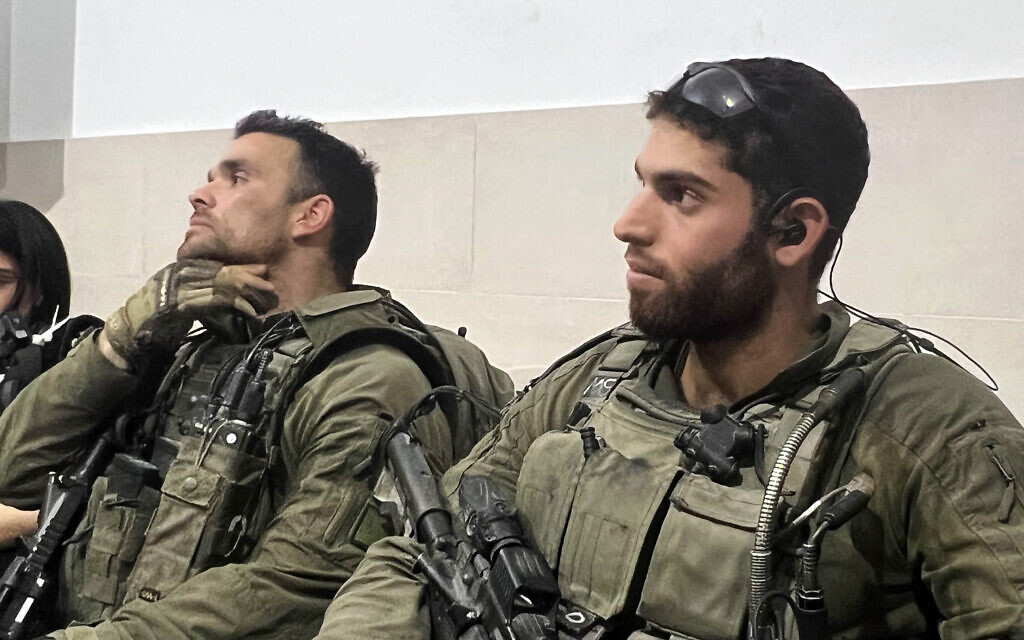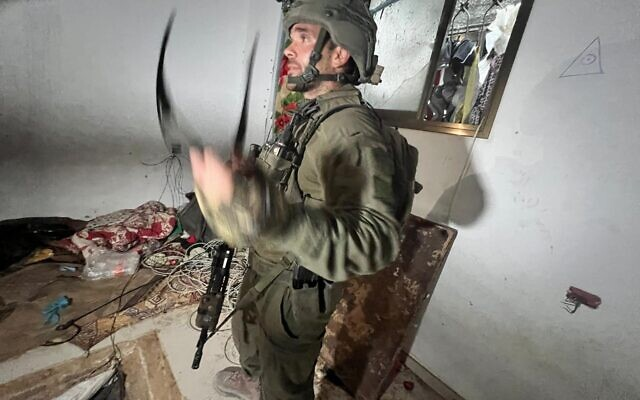Bodies of 4 Hostages Found Under a Rug in an Innocent Civilian’s Home in Gaza...
Under a rug in Gazan home, IDF troops found shaft leading to bodies of 4 hostages
The Times of Israel joins paratroopers fighting in the heart of Jabaliya’s refugee camp, where a determined officer made a sad but profound discovery — days before he was killed
Three drones patrolled overhead in languid circles. A smaller quadcopter took off buzzily from a four-story structure, which a Hamas commander had called home until Paratrooper Battalion 202 stormed into the Jabaliya refugee camp two weeks ago.Now, Lt. Col. Almog Rotem uses the building in the northern Gaza Strip as a temporary command post, as his forces continue to drive toward the sea, flushing out organized Hamas resistance.Across a narrow alley — now strewn with pieces of concrete and metal, clothing, and the detritus of urban combat — sits a smaller home with a jagged hole blasted into one side. Inside, a small child’s bike and a wheelchair lie crumpled amid the cinder blocks.A family had lived in that home until they cleared out ahead of the Israeli paratroopers’ arrival. But amid the furniture and children’s toys, the house had contained a gruesome secret.Last Thursday, the bodies of four Israeli hostages kidnapped on October 7– Itzhak Gelerenter, Amit Buskila, Ron Benjamin and Shani Louk – were discovered by Israel Defense Forces troops in a tunnel dug under that very home…..

JABALIYA — Three drones patrolled overhead in languid circles. A smaller quadcopter took off buzzily from a four-story structure, which a Hamas commander had called home until Paratrooper Battalion 202 stormed into the Jabaliya refugee camp two weeks ago.Now, Lt. Col. Almog Rotem uses the building in the northern Gaza Strip as a temporary command post, as his forces continue to drive toward the sea, flushing out organized Hamas resistance.Across a narrow alley — now strewn with pieces of concrete and metal, clothing, and the detritus of urban combat — sits a smaller home with a jagged hole blasted into one side. Inside, a small child’s bike and a wheelchair lie crumpled amid the cinder blocks.
A family had lived in that home until they cleared out ahead of the Israeli paratroopers’ arrival. But amid the furniture and children’s toys, the house had contained a gruesome secret.Last Thursday, the bodies of four Israeli hostages kidnapped on October 7– Itzhak Gelerenter, Amit Buskila, Ron Benjamin and Shani Louk – were discovered by Israel Defense Forces troops in a tunnel dug under that very home.Get The Times of Israel's Daily Editionby email and never miss our top storiesBy signing up, you agree to the terms
Under the carpet
The battalion chose to operate in that section of the densely packed refugee camp, which had yet to be conquered by the IDF, because of analysis that came up from the battalion’s intelligence officer.Through his study of intelligence, the officer “noticed that there were elements that interest us,” said Rotem, “and we understood that there is something here.”

The paratroopers, fighting under Division 98, attacked the Hamas positions from the east, focusing on well-prepared enemy positions connected by holes through walls in adjoining homes.ADVERTISEMENT“There is not a house here in which we didn’t find at least 5 improvised explosive devices waiting,” said Rotem.“The holes create a network between the buildings,” he explained, as the stench of death hung in the air. “The terrorists here know how to set up ambushes in killing zones in alleys, in yards.”“We met an enemy that is a bit more determined and ready,” explained one of the company commanders. “We took them apart very quickly. But it was a system that functioned. When a drone appeared, so did mortars or rockets. If there was sniper fire, then there was an RPG.”“They set up well here,” said Rotem. “But we were able to neutralize the obstacles, to get around, to show up from unexpected directions, and to reach the situation in which this enemy is destroyed.”Dozens of Hamas fighters were killed by Rotem’s troops, among 400 eliminated by the division in Jabaliya.“There is nothing that can stop an IDF battalion or an IDF brigade,” he asserted.After the enemy force is defeated, the troops have to embark on the dangerous work of checking every structure for weapons, intelligence and, of course, tunnels.A platoon commanded by Cpt. Roy Beit Yaakov entered the booby-trapped house next to Rotem’s headquarters to search it.

Even after eight months of constant fighting across the Gaza Strip, the troops went out of their way to check every closet and corner.Battalion 202 commander Lt. Col. Almog Rotem stands over the tunnel shaft in which the bodies of four Israeli hostages – Itzhak Gelerenter, Amit Buskila, Ron Benjamin and Shani Louk – were found, May 22, 2024. (Lazar Berman/Times of Israel)Beit Yaakov insisted on pulling up a rug in one of the rooms, and found a square metal door in the middle of the floor.He reported on the radio that he had found a tunnel shaft, and Rotem secured the area and summoned a force from the Combat Engineering Corps’ elite Yahalom unit. The force, known as Samech 2, was commanded by Captain Aleph, who can only be referred to by his Hebrew initial.Beneath the trapdoor, the Yahalom force uncovered a shaft about ten meters (30 feet) deep, with a metal ladder bolted into one of the corners.The entrance to the tunnel in northern Gaza where the bodies of four Israeli hostages – Itzhak Gelerenter, Amit Buskila, Ron Benjamin and Shani Louk – were discovered in May 2023. (Lazar Berman/Times of Israel)It didn’t look different from dozens of other shafts they had found, but Aleph insisted on using all the tools available at his disposal to comprehensively search the tunnel.“We discovered explosives at the entrance to the shaft,” Aleph told The Times of Israel. “We began operating underground, carefully, with determination, using intuition. We found several suspicious areas, which ultimately led us to locate the hostages and to extract them that same night,” he said, referring to the bodies of Benjamin, Buskila, Gelerenter and Louk.“Having confirmed they were our hostages, there is no greater pride than that,” Aleph continued. “There is no greater privilege. And we want to continue ceaselessly to bring more and more hostages home.

”ADVERTISEMENTCaptain Aleph, of the IDF’s Combat Engineering Corps’ elite Yahalom unit, whose troops uncovered a tunnel shaft in which the bodies of four Israeli hostages – Itzhak Gelerenter, Amit Buskila, Ron Benjamin and Shani Louk – were found in May 2024. (Lazar Berman/Times of Israel)“There is no one more proud than us that we could bring the bodies of Israelis back for a proper burial in Israel,” said Rotem.Days later, Beit Yaakov was killed in a friendly fire incident that also took the lives of four of his soldiers.Family and friends of Captain Roy Beit Yaakov attend his funeral at the Mount Herzl Military Cemetery in Jerusalem on May 16, 2024. (Chaim Goldberg/Flash90)One of the company commanders stressed that his troops were not worn down, even after eight months of war: “They’re not tired. We are in a routine of war. This is our world.”“Finding the hostages gave them a second wind, and the troops really understand the mission here,” he said. “They come ready to do the work because it’s bigger than us. We still have hostages to get back.”As skeptics in Israel and abroad claim that the IDF faces a grinding fight against an organization that will continue to reemerge wherever its forces leave, Rotem said he was not worried about the pace of the fighting.“There is no hastiness in place,” he told The Times of Israel. “There is a long war, one that demands a lot of thought and a lot of planning. I trust my superiors to do the appropriate planning, and to utilize the right manpower at the right time.”Weapons and military equipment seized by IDF troops in northern Gaza’s Jabaliya, in a handout image released May 19, 2024. (Israel Defense Forces)Victory will come, he said, with Israel destroying Hamas’s center of gravity — its people and its infrastructure.ADVERTISEMENTAnd they will do it within the necessary laws and values, the officers said.“We pay a lot of attention to international law,” said a company commander. “It doesn’t get in our way. In the end, we carry out our missions, and where we encounter terrorists, they die.”Earlier this week, the International Criminal Court’s chief prosecutor announced he was seeking arrest warrants against Israel’s prime minister and defense minister for alleged war crimes.Rotem was confident his troops were fighting the way he and their country expect them to.“My soldiers are Israelis, and they grow up with values from the home — a sense of mission, a love for the homeland, and love for fellow man,” he said.“We’ve encountered a lot of enemy forces,” he continued. “We’ve taken a lot of detainees. I haven’t heard of a single instance where soldiers did something out of revenge or abused them in some way or another. I saw them operating with determination, with professionalism, and especially with proportion.”“I know who my soldiers are, and I know who their commanders are.”




